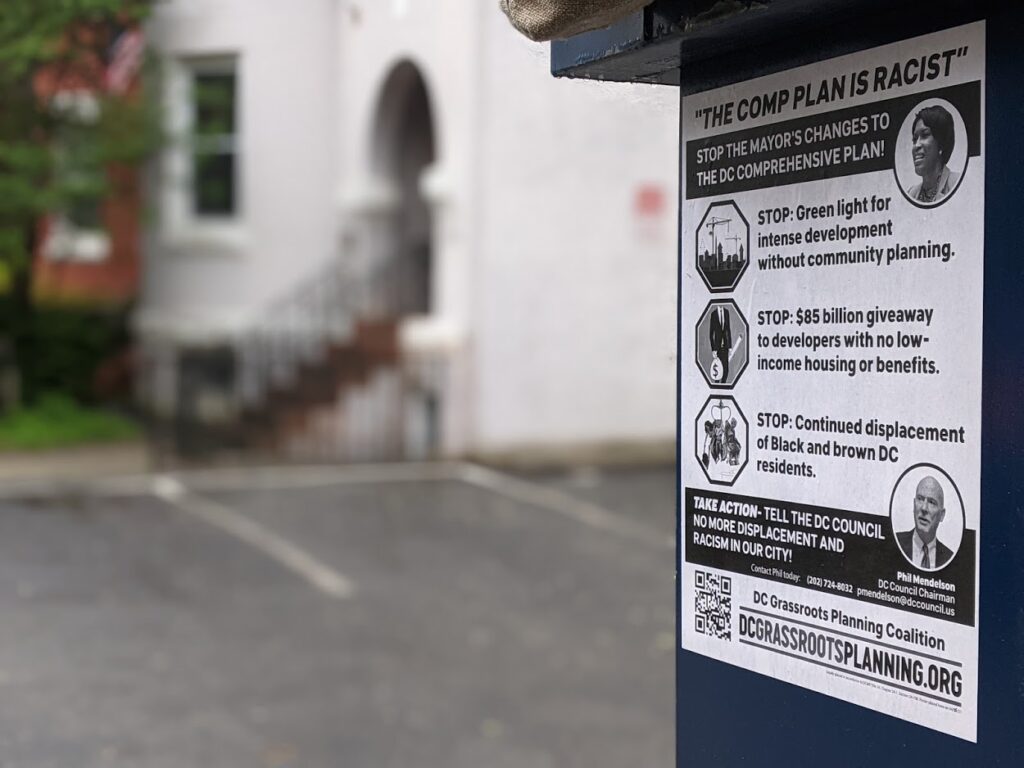After 5 years of intense public input and massive revisions, the D.C. Council unanimously approved the Comprehensive Plan Amendment Act of 2021 on Tuesday. The decision was made only hours after a lawsuit was filed by 12 District residents in D.C. Superior Court against passing the amendment, saying that while the amendment is less racist than it was when first introduced, it “is still a racist plan.”
The amendment approved is a 1,500 page tome that plans for how the government wants to develop buildings and housing in the District. While the Comprehensive Plan is not law, the Office of Planning is guided to approve construction that is “not-inconsistent” with the plan.
[Read more: Here’s everything you need to know about the Comp Plan, which has massive implications for affordable housing in DC]
Tuesday’s vote considered three additional amendments to the main Comprehensive Plan amendment: one from Council Chair Phil Mendelson, another from Ward 8 Councilmember Trayon White, and the last from At-large Councilmember Robert White. The amendments update the definition of “deeply affordable housing” to housing affordable to people making 40% of the median family income. This is a definition that critics of the plan, like the D.C. Grassroots Planning Coalition, have been asking for throughout the amendment process. Deeply affordable housing marked at 40% MFI would also be priced near or equal to the median income for Black households in the District.
“I will be voting yes on the Comp Plan because of these changes,” said Ward 4 Councilmember Janeese Lewis George. She and At-large Councilmember Elissa Silverman both abstained during the amendment’s first reading over concerns of the plan exacerbating racial inequity in the District. “This is a tremendous opportunity to marshal our resources…for more housing that is actually attainable for Black families in D.C.”
[Read more: DC Council advances Comprehensive Plan despite concerns from its new Council Office of Racial Equity]
A section that asks the Office of Planning to consider building “social housing,” or housing owned by the D.C. government or non-profits that will be permanently affordable, was also added to the plan. The concept was a focal point of Will Merrifield, a former Washington Legal Clinic for the Homeless attorney, when he ran for D.C. Council last year. This year’s effort was spearheaded by the D.C. Tenants’ Advocacy Coalition and the Dupont East Civic Action Association. This is bolstered by Ward 5 Councilmember Kenyan McDuffie’s call to the Mayor to buy the Marriott Wardman Hotel, currently held in bankruptcy court, and turn it into social housing.
“We haven’t seen a project with this much potential, just in terms of space,” said Caitlin Cocilova, attorney for the Washington Legal Clinic and steering member of the Grassroots Planning Coalition. She talked at a DECAA meeting the night before the vote about the potential of making Wardman a community-led development of deeply affordable housing units.
However, Black and brown communities who were critical of the Comp Plan’s vision to increase the population and building density in their area say that the plan as passed would not help protect them from displacement. Minnie Elliott, president of the Brookland Manor / Brentwood Village Residents Association has been challenging the Zoning Commission for approving developer MidCity Financial’s project to redevelop some of the city’s last “naturally affordable” apartments at Brookland Manor and build high-rise apartments in their area. She says rising costs would push Black and brown residents out of the community, and the planned apartments do not include the 4- and 5-bedroom apartments that many current multigenerational households need.
She told Street Sense Media that while she is appreciative of the addition of racially equitable language, there is no definitive language that protects families from displacement. “Development will continue to displace Black families because the changes in the Comp Plan really do nothing new to save any of us,” Elliott said.
[Read more: Court allows Brookland Manor redevelopment to proceed, drawing alarm from community activists]
Similarly, the lawsuit filed the same day as the plan was passed raised longstanding concerns about ongoing displacement of residents of color from D.C. The suit focused on the Future Land Use Map, which depicts how the government wants to develop the city. It outlines certain areas for “up-zoning.”. One of the plaintiffs is Chris Otten, known as a “champion disrupter” of luxury developments in the District. He is engaged in multiple lawsuits against developers, including McMillan Park.
“We will be directly affected by the Comprehensive Plan up-zoning via the streetcar extension on Benning Road NE … [which] will displace the long-time African-American residents in this residential zoned community,” said David Belt, a Ward 7 resident and plaintiff. The council has yet to address the lawsuit.
CORRECTION (05.21.2021)
The word “former” has been added to clarify that Will Merrifield has not worked for the Washington Legal Clinic for the Homeless since he left to focus on his campaign for D.C. Council last year.




